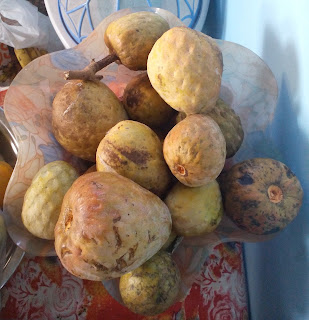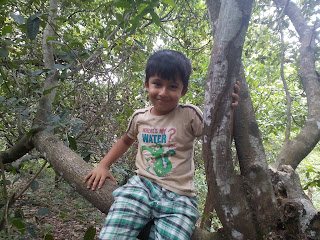When I say "
I bought a farm" first thing people ask is "What are you planning to grow there?" Some "experienced" farmers suggested me to clear the forest area and plant their favorite cash crops like
areca,
rubber etc. They also suggested me to fill up soil in the low lying paddy fields and plant the cash crops there too. Initially I tried explaining our philosophy of
natural farming or
permaculture - which many did not get or thought I have gone insane. This post is an effort to clearly document our philosophy and plans for the farm.
 |
| Custard apples harvested from the farm |
Chemical intensive "modern agriculture" (so called) we are practicing today is depleting earth of its fertility and making it sterile. Heavy chemical usage combined with continuous pumping out of water stored deep under the earth has played havoc with water table. One problem is water table going down ever deeper and the other problem is whatever is there is polluted with chemicals leached down by the irrigation water. Some areas in Maharashtra and Andhra Pradesh in India are now
pumping out water from 1000+ feet deep aquifers containing water stored during stone age. These aquifers cannot be recharged. That emergency storage is gone once they are emptied. You can imagine what will happen to these areas in next few years after the farmers run out of this water. No doubt we will end up with large deserts. Half century back average depth of water table in whole of India was not more than few tens of feet. Same land has faced disastrous consequences after "green revolution" promoted unscrupulous subsidized chemical usage and uncontrolled pumping out of water backed by free electricity supply for agricultural pumps.
 |
| A citrus fruit harvested from the farm |
If we understand the seriousness of this problem and start thinking what is the solution we get the answer not too far away - we see it in any natural forest nearby (if you are lucky to see one nearby). Plants grow vigorously, healthy in any natural forest. Nobody puts chemical fertilizers. Nobody sprays pesticides. Plants of all varieties coexist and grow to reach the sky. In fact plants just want to grow because they start dying the moment they stop growing. That is why you see a plant seed fallen on a boulder or on roof of a building growing without any assistance. Problem begins when we start fiddling with the nature. That is why
Masanobu Fukuoka says - incomplete human knowledge is the problem. Human knowledge about nature will remain incomplete because nature is very complex. The science we follow today is called reductionist science as it reduces the problem to very few parameters for the sake of study. But nature does not obey this reductionist approach. For example if you take growth of rice as a study subject, there are so many parameters like temperature, rain fall (intensity and timing of rain), sun light intensity, insects, bacterium in the soil interacting with the plant roots, oxygen and CO2 content in the air etc. Nuclear radiation absorbed by clouds passing over
Fukushima nuclear disaster site may affect rice growth! Realistically, number of parameters is endless. There is no way a scientist can study the plant growth and yield keeping all these parameters and their continuous variations in view. Therefore scientist chooses handful of parameters to control them in a green house and studies them. But that reductionist view does not hold good in field where all parameters continuously vary. Therefore only way one can understand this complex nature to some extent is by carefully observing the nature itself.
Masanobu Fukuoka developed his method of natural farming by observing the nature for several decades and after several failed attempts.
Masanobu Fukuoka's book
One Straw Revolution published in 1975 beautifully explains this.
Purists of non chemical philosophy are divided into philosophies of
natural farming and
permaculture. We don't consider organic farming for this discussion because one can use "approved" chemicals (some of which are toxic too) in approved quantities and still be certified organic! This kind of organic farming can damage earth as much as any kind of chemical farming does, if not more. Therefore we disagree with organic farming; it is not for us.
 |
| Little Ishaan (my son) on a cashew tree |
Natural farming philosophy was promoted by Masanobu Fukuoka.
Natural farming is what it literally means - allow nature to do its work with minimum human intervention. Human intervention is mainly in the form of harvesting the produce, returning excess to the nature and sowing the seeds of the plants useful for humans.
Permaculture is a term coined by
Bill Mollison in 1978.
Permaculture is derived from "permanent agriculture" or "permanent culture". For us "permanent agriculture" looks most appropriate.
Permaculture also follows the principle of allowing nature to do its job.
Permaculture is more methodical or formal than natural farming because usually there is a formal "design" process employed in case of
permaculture.
Permaculture design involves designing different zones and a pattern of companion plants to help each other.
Note: Bill Mollison and few others have tried to copyright/restrict usage of terms like "permaculture", "permaculture design" and "permaculture design course" in different ways. None of those attempts have been successful. Many applications to statutory/regulatory bodies have been either rejected or withdrawn by the applicant. As far as we know none of the terms related to permaculture are copyrighted or restricted.
Both these philosophies aim at preventing damage to the earth and reversing already done damage. We look at both of them as philosophies for healing the earth where humans help nature to do its best by reducing interference with nature. Both of them shun chemicals like plague. That is what we believe in very strongly - avoid all chemicals, allow nature to do its best. However, we are not purists. Therefore we treat both natural farming and permaculture as twin children of mother earth. We don't differentiate between them. At the same time we don't mind using natural and non-toxic amendments like lime or micro nutrients when the soil really needs it. We may throw some cow dung manure at our vegetable beds once in a while if we feel the need for it. We may also use some mulch to suppress weeds when needed. Other than that we don't want to interfere with nature. We plan to keep farm animals like cows, dogs, chicken and water birds like ducks to work with nature. By the way, we already have 2 cows with calves and a puppy in our rented house waiting to enter the farm as soon as we construct a house and move into the farm. Our goal is to live a self sustaining life with minimum inputs and dependency on outside world. We will be able to live comfortable and happy life even if the worst kind of economic disaster strikes the world because we will be able to live without cash.
We want to develop a food forest in the forest area of the farm. Forest area has several native trees. You can imagine the number of trees if I say whole ground is covered with several inches thick leaf litter when those trees shed their leaves in winter. Soil is very fertile like in a forest because of these fallen leaves rotting down every year.
 |
| Thick layer of leaf litter on the ground |
Several fruit trees like custard apple, mango, jack fruit, citrus and cashew are already in the farm.
In last monsoon we planted 3 varieties of
guava,
custard apple, 2 varieties of
sapota, 5 varieties of
mango, 5 varieties of
citrus, 10 varieties of
jack fruit,
cinnamon, Indian sour cherry,
Singapore cherry,
nutmeg,
bread fruit,
mangosteen,
lychee,
fig,
clove,
pomegranate, and
butter fruit saplings in approximately 8% of the area (92% more left to be planted!). Almost all the plants except clove have survived so far. This scorching summer is the litmus test for my farming skills. I hope I will be able to keep them alive through this summer. Keeping fingers crossed. Goal is to achieve a permanent system which needs very little maintenance after the plants grow and develop deep roots. After that there is no much work, only enjoy the "fruits" of our labor.
By the way list of saplings I listed above are only one level of canopy in multiple canopy system. Some people say 7 levels, some say 9 levels - let us just say multi level to emphasis the fact that we can get really good productivity by emulating natural forests where plants of different heights grow close to each other producing abundant amount of food. Roughly these are the levels we are going to have in the farm:
- Tall trees
- Short/dwarf trees
- Shrubs
- Herbs
- Tubers/root vegetables (underground)
- Creepers/climbers (climbing on trees and shrubs)
Paddy fields below the forest area had been left fallow (un-cultivated) for last 2 years. Planning to do some paddy this year as an experiment using natural farming technique. Only time will tell the results. I will post a new article about how that experiment goes and the outcome of it. I am planning to sow some seed mixture in the remaining area to avoid weeds growing there. For now we have decided to keep the paddy fields for growing grains. We may convert a part of it to food forest if we find we don't need so much area to grow grains.
 |
| Paddy fields left fallow (un-cultivated) |





This is too good. Going forward it should be was of life....will motivate many....for sure...
ReplyDeleteWow! exciting stuff and Wish your farm a Great Success this year!
ReplyDelete